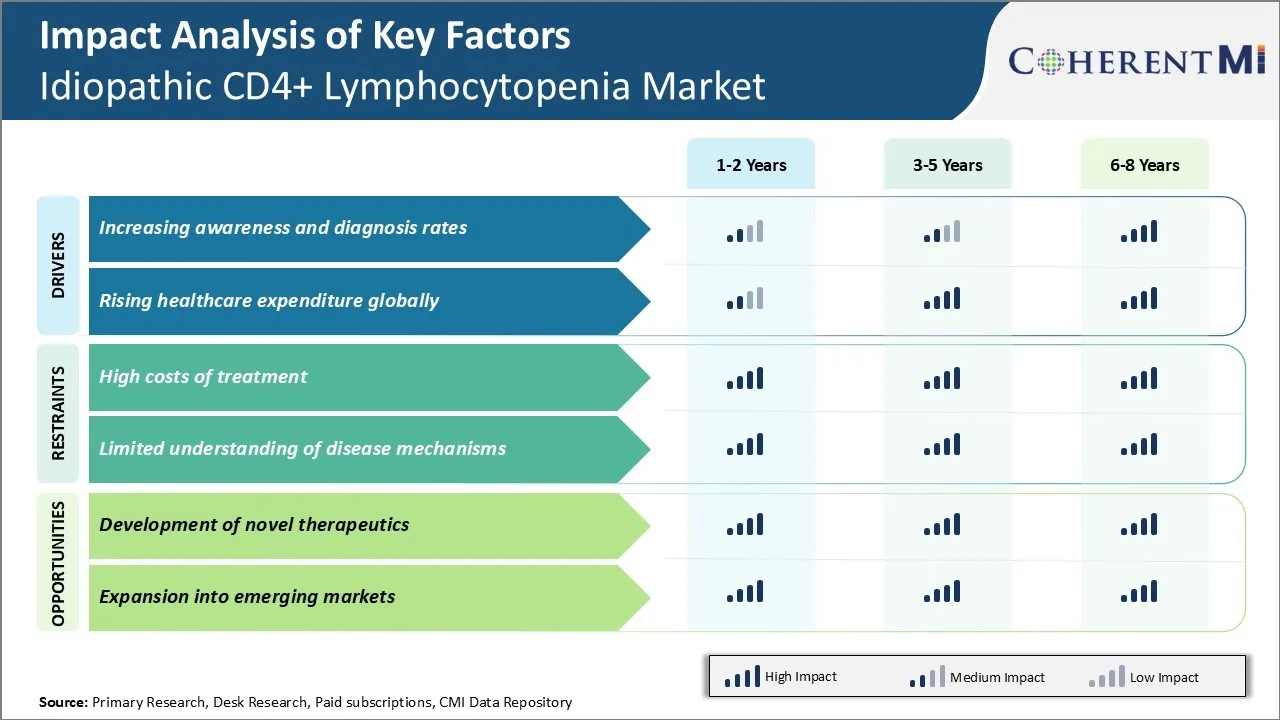Idiopathic CD4+ Lymphocytopenia Market Trends
Market Driver - Increasing Awareness and Diagnosis Rates
Idiopathic CD4+ lymphocytopenia, although rare, is one such disease that is gaining recognition in the medical community as well as among public. However, improved diagnostic tools and techniques allow for more accurate identification of idiopathic CD4+ lymphocytopenia. Advanced blood tests can now determine precise CD4 counts and rule out other potential reasons for low CD4 levels.
People themselves have become more proactive about their health and do not hesitate to seek medical advice for persistent health issues. They widely consult online health sources to learn about various illnesses and think it wise to get appropriate tests done. This raises the chances of idiopathic CD4+ lymphocytopenia getting diagnosed at an early stage. Early diagnosis plays a vital role in improving outcomes. It allows doctors to counsel patients suitably and promptly start prevention and treatment interventions.
This empowering environment contributes to more idiopathic CD4+ lymphocytopenia cases coming to light. With a name finally put to their health experiences, patients feel relieved and are better able to comply with long-term care plans. All such awareness and diagnostic improvements are certainly expanding the addressable market for idiopathic CD4+ lymphocytopenia.
Market Driver - Rising Healthcare Expenditure Globally
Many developing nations are raising their national health budgets substantially to strengthen their healthcare infrastructure and expand insurance coverage to disadvantaged strata. Adoption of universal healthcare models by various countries is a huge boon for patients with lifelong needs like those with idiopathic CD4+ lymphocytopenia. When medical expenses are shouldered by the state, underprivileged patients are no more worried about the high costs of managing this chronic condition.
With favorable economic conditions globally, household incomes are consistently rising across socio-economic categories. Individuals are willing to invest more discretionary funds for securing their health, if needed from personal savings or via supplementary insurance schemes. The upper-middle and affluent populations in developing nations particularly can readily pay for world-class healthcare for rare diseases like idiopathic CD4+ lymphocytopenia. This affords considerable market potential in these emerging markets.
In summary, as long as spending on healthcare remains a rising priority worldwide, requirements relating to idiopathic CD4+ lymphocytopenia will gain further funding support from governments as well as self-paying patients. This spending environment creates a positive outlook for the expansion of diagnostic and treatment services for this patient group.

Market Challenge - High Costs of Treatment
One of the major challenges faced by the idiopathic CD4+ lymphocytopenia market is the high costs associated with treatment of this condition. Developing effective treatment options for idiopathic CD4+ lymphocytopenia is very challenging given the rarity and uniqueness of the disease.
The low prevalence of the disease means pharmaceutical companies have little financial incentive to invest heavily in research and development of new drugs. Existing treatment options such as anti-retroviral therapy, prophylactic antibiotics, and immunoglobulin therapy can be very expensive for patients. The lifelong nature of treatment also places a huge financial burden on patients and healthcare systems.
Access to costly medications is a challenge, especially in developing countries with limited healthcare budgets. High drug prices can reduce treatment compliance and adherence over the long-term. This poses problems for effective clinical management of the condition. Further research into lower-cost alternatives, as well as strategies to make existing therapies more affordable, is needed to improve outcomes and quality of life for patients living with idiopathic CD4+ lymphocytopenia.
Market Opportunity - Development of Novel Therapeutics
One major opportunity for growth in the idiopathic CD4+ lymphocytopenia market is the development of novel therapeutics to treat the condition. Currently available treatment options are limited and focus mainly on managing symptoms rather than targeting the underlying causes and restoring normal immune function. With a better understanding of the pathogenesis of idiopathic CD4+ lymphocytopenia emerging from ongoing research, there is potential to develop more targeted drugs.
Promising areas being explored include novel monoclonal antibodies, immune-based therapies such as adoptive T-cell transfer, gene therapy techniques, as well as therapies targeting specific cellular pathways and molecules implicated in the disease process.
Development of well-tolerated and effective new treatment options could help address unmet needs and expand the clinical management of idiopathic CD4+ lymphocytopenia. This represents a major opportunity for pharmaceutical companies to develop first-in-class therapies and capture a share of the orphan drug market for this rare condition.